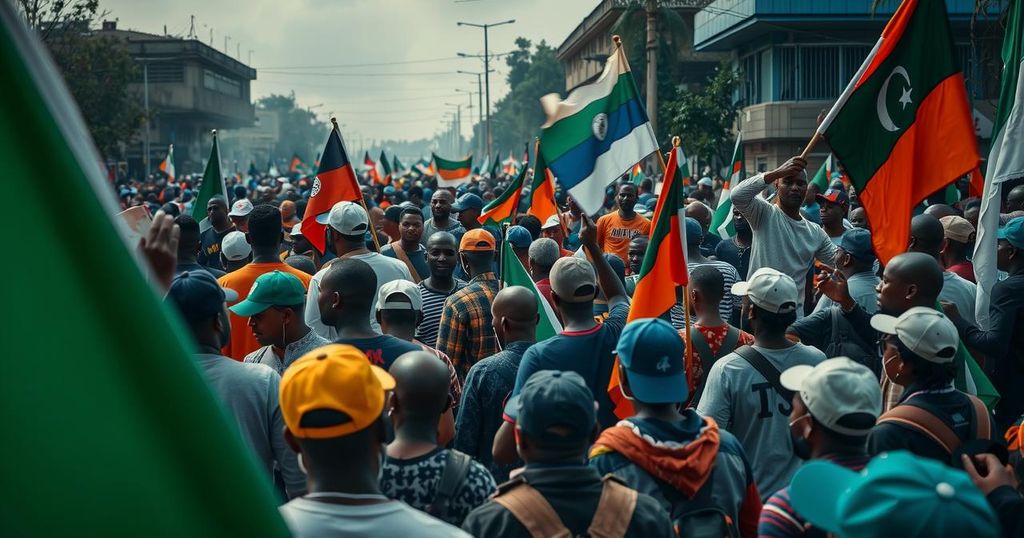Nigerians are protesting against severe economic hardships caused by government policies, leading to soaring food prices and discontent with governance. Following recent demonstrations where police used force, citizens continue to demand change, including the reduction of utility costs and the release of arrested protesters. The unrest reflects a broader societal struggle against policies seen as favoring the wealthy at the expense of the poor, with calls for more responsive governance amid growing economic challenges.
Citizens across Nigeria have mobilized for the second time within two months to express their discontent over severe economic hardships exacerbated by government policies perceived as detrimental to the poor. Notably, in Abuja, law enforcement resorted to utilizing tear gas to disperse protestors demanding an end to oppressive governance and soaring food prices. This wave of disobedience coincided with Nigeria’s 64th Independence Day celebrations, a day many claim is overshadowed by widespread poverty. According to Juwon Sanyaolu, a leading figure in the Take it Back movement, the government is disconnected from the populace. “The ordinary people are suffering, but this government doesn’t care because they cannot feel the pulse of the ordinary people,” he stated. Protests continue to escalate against fiscal policies advised by the World Bank, including a controversial fuel subsidy removal that has led to unbearable inflation rates and skyrocketing costs of essential goods. Citizens argue that the government must prioritize their needs instead of catering to foreign interests. Although police responded forcefully to suppress protests in certain urban areas, gatherings were still observed, particularly in Lagos, in contrast to the heavy police presence in cities like Ilorin. Protesters are advocating for reduced electricity prices and the release of those arrested during previous demonstrations, reflecting the urgency of their situation amidst devastating inflation that has compounded the financial burden on many families. Food inflation has reached alarming levels, with staple items becoming prohibitively expensive. The past year has seen basic food prices triple, leaving many unable to afford even one substantial meal daily. The minimum wage adjustments have been insufficient against the rising cost of living, exacerbated by insecurity and inefficiencies within local production systems. Experts reveal that President Bola Ahmed Tinubu’s economic reforms have done little to alleviate public suffering. While recent cash transfers have been announced, citizens remain skeptical of their effectiveness. Despite the government’s reassurances regarding food production and security measures, widespread unrest remains, verging on what some analysts deem a potentially transformative period akin to an ‘African Spring.’ Rights groups have criticized the authoritarian tactics employed by the current administration to suppress dissent and maintain order, reminiscent of Nigeria’s historical struggles against dictatorship. The heavy-handed approach to protest control, compounded by harsh legal repercussions for demonstrators, illustrates the ongoing tensions between citizens demanding economic justice and a government perceived as unyielding to their plight. The protests are expected to persist until substantial reforms are enacted that address the core economic issues affecting the populace.
Nigeria is currently facing unprecedented economic hardship, with inflation rates for food reaching their highest levels in decades. Amidst this backdrop, citizens have taken to the streets to voice their frustrations against government policies perceived as neglectful of the impoverished majority. The protests are rooted in longstanding grievances about governance and the economic wellbeing of ordinary Nigerians, raising wider concerns about potential civil unrest and the government’s capacity to respond effectively to public discontent.
In conclusion, the protests in Nigeria underscore the discontent of citizens grappling with severe economic strain exacerbated by government policies. The responses from officials, including attempts to quell dissent through coercive measures, will play a significant role in shaping the future of governance in Nigeria. Continued mobilization by citizens indicates a readiness to push back against perceived injustices, asserting their rights and demanding accountability from those in power.
Original Source: www.aljazeera.com






